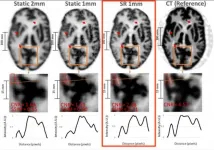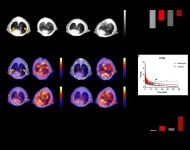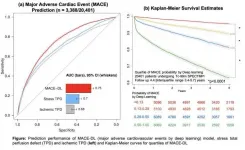Young adults who lost and then restored heart health had lower risk of heart attack, stroke
Circulation journal report
2021-06-14
(Press-News.org) DALLAS, June 14, 2021 -- Preserving good cardiovascular health during young adulthood is one of the best ways to reduce risks of premature heart attack or stroke, according to new research published today in the American Heart Association's flagship journal Circulation.
The number of premature deaths from cardiovascular disease is increasing in many countries including the U.S. While there is a wealth of information available on maintaining good heart health during and after midlife to reduce the risks of heart attack and stroke, data about cardiovascular health during young adulthood is scarce.
"Most people lose ideal cardiovascular health before they reach midlife, yet few young people have immediate health concerns and many do not usually seek medical care until approaching midlife," says the study's senior author Hyeon Chang Kim, M.D., Ph.D., a professor in the department of preventive medicine at Yonsei University College of Medicine in Seoul, South Korea. "We need strategies to help preserve or restore heart health in this population because we know poor heart health in young adults is linked to premature cardiovascular disease."
Using the Korean National Health Insurance Services, a nationwide health insurer database, Kim and colleagues analyzed information collected from more than 3.5 million adults who completed routine health exams in 2003 and 2004. A subgroup of approximately 2.9 million participants underwent a follow-up health examination between 2005 and 2008. Patients' ages ranged from 20 to 39 at the time of the first exam, and 65.5% of the study participants were male.
Participants were categorized according to ideal cardiovascular health (CVH) scores based on the American Heart Association's Life's Simple 7® metrics. Patients received "one point" towards a cardiovascular health (CVH) score for each of the following measures from Life's Simple 7: well-maintained blood pressure, low total cholesterol, acceptable blood sugar levels, an active lifestyle, healthy weight and not smoking. Of note: healthy nutrition and diet, the final measure of Life's Simple 7, was not included in this analysis because dietary information was not collected from participants in this database.
Researchers evaluated the total number of first hospitalizations or death from a heart attack, stroke or heart failure by December 31, 2019 to define outcomes. The researchers found:
Rates of premature (younger than 55) cardiovascular events were highest among patients with a CVH score of zero.
A higher CVH score by one point led to reduced risks for heart attack by 42%, heart failure by 30%, cardiovascular death by 25% and stroke by 24%.
While people who improved their CVH score over time reduced their risk of hospitalizations or death from a heart attack, stroke or heart failure, people who began with and maintained a higher CVH score ultimately had the least chance of hospitalization or death from a heart attack or stroke during the study period.
Timely and consistent monitoring of heart health among young adults is important to prevent premature onset of heart disease and reduce the risk of cardiovascular events.
The study's findings may be limited because data was routine health screening data, therefore, it may not be as robust as data collected primarily for a specific study. The study also lacks data on the participants' eating patterns, so researchers modified CVH score metrics to exclude diet. In addition, participants in this study were of Korean ancestry, so the results may not be generalizable to people from other diverse racial or ethnic groups.
INFORMATION:
Co-authors are Hokyou Lee, M.D.; Yuichiro Yano, M.D., Ph.D.; So Mi Jemma Cho, Ph.D.; Hyeok-Hee Lee, M.D.; Dong-Wook Kim, Ph.D.; and Donald M. Lloyd-Jones, M.D., Sc.M. Author disclosures are listed in the manuscript.
The study was partially supported by a grant from the Korea Health Technology R&D Project through the Korean Health Industry Development Institute and funded by the Ministry of Health and Welfare of the Republic of Korea.
Additional Resources:
Available multimedia is on right column of release link - https://newsroom.heart.org/news/young-adults-who-lost-and-then-restored-heart-health-had-lower-risk-of-heart-attack-stroke?preview=b8c2ae3198b6940d702b3fe8f5a51b62
After June 14, view the manuscript online.
Healthy habits are key to maintaining health even while taking multiple prescriptions
Middle-aged adults with healthy heart habits may lower high blood pressure risk years later
Follow AHA/ASA news on Twitter @HeartNews
Follow news from the AHA's flagship journal Circulation @CircAHA
Statements and conclusions of studies published in the American Heart Association's scientific journals are solely those of the study authors and do not necessarily reflect the Association's policy or position. The Association makes no representation or guarantee as to their accuracy or reliability. The Association receives funding primarily from individuals; foundations and corporations (including pharmaceutical, device manufacturers and other companies) also make donations and fund specific Association programs and events. The Association has strict policies to prevent these relationships from influencing the science content. Revenues from pharmaceutical and biotech companies, device manufacturers and health insurance providers are available here, and the Association's overall financial information is available here.
About the American Heart Association
The American Heart Association is a relentless force for a world of longer, healthier lives. We are dedicated to ensuring equitable health in all communities. Through collaboration with numerous organizations, and powered by millions of volunteers, we fund innovative research, advocate for the public's health and share lifesaving resources. The Dallas-based organization has been a leading source of health information for nearly a century. Connect with us on heart.org , Facebook , Twitter or by calling 1-800-AHA-USA1.
ELSE PRESS RELEASES FROM THIS DATE:
2021-06-14
Nonsteroidal anti-inflammatory drugs (NSAIDs) such as ibuprofen provide better pain control and have fewer adverse effects than codeine, a commonly prescribed opioid, when prescribed after outpatient surgery, according to new research published in CMAJ (Canadian Medical Association Journal) https://www.cmaj.ca/lookup/doi/10.1503/cmaj.201915.
"In all surgery types, subgroups and outcome time points, NSAIDs were equal or superior to codeine for postoperative pain," writes Dr. Matthew Choi, Associate Professor of Surgery, McMaster University, with coauthors.
The researchers conducted a systematic review and meta-analysis of 40 high-quality randomized controlled trials (RCTs) involving more than 5100 adults to compare pain levels and safety of medications containing codeine, such as Tylenol ...
2021-06-14
The raucous calls of tree hyraxes -- small, herbivorous mammals -- reverberate through the night in the forests of West and Central Africa, but their sound differs depending on the location.
Tree hyraxes living between the Volta and Niger rivers make a barking call that is distinct from the shrieking vocalizations of hyraxes inhabiting other regions of the African forest zone.
A new study in the Zoological Journal of the Linnean Society co-authored by Yale anthropologist Eric Sargis finds that the barking hyraxes are a separate species from their shrieking neighbors. The newly described species, Dendrohyrax interfluvialis, ...
2021-06-14
Reston, VA (Embargoed until 5:00 p.m. EDT, Sunday, June 13, 2021) - A new imaging technique has the potential to detect neurological disorders--such as Alzheimer's disease--at their earliest stages, enabling physicians to diagnose and treat patients more quickly. Termed super-resolution, the imaging methodology combines position emission tomography (PET) with an external motion tracking device to create highly detailed images of the brain. This research was presented at the Society of Nuclear Medicine and Molecular Imaging's 2021 Virtual Annual Meeting.
In brain PET imaging, the quality of the images ...
2021-06-12
Reston, VA (Embargoed until 4:30 p.m. EDT, Saturday, June 12, 2021)--Positron emission tomography (PET) using a 68Ga-labeled fibroblast activation protein inhibitor (FAPI) can noninvasively identify and monitor pulmonary fibrosis, according to research presented at the Society of Nuclear Medicine and Molecular Imaging 2021 Annual Meeting. By binding to activated fibroblasts present in affected lungs, FAPI-PET allows for direct imaging of the disease process.
Idiopathic pulmonary fibrosis (IPF) causes substantial scarring to the lungs, making it difficult for ...
2021-06-12
Reston, VA (Embargoed until 6:15 p.m. EDT, Friday, June 11, 2021)--An advanced artificial intelligence technique known as deep learning can predict major adverse cardiac events more accurately than current standard imaging protocols, according to research presented at the Society of Nuclear Medicine and Molecular Imaging 2021 Annual Meeting. Utilizing data from a registry of more than 20,000 patients, researchers developed a novel deep learning network that has the potential to provide patients with an individualized prediction of their annualized risk for adverse events such as heart attack or death.
Deep learning is a subset of artificial intelligence that mimics the workings of the human brain to process ...
2021-06-11
For decades, the ice shelf helping to hold back one of the fastest-moving glaciers in Antarctica has gradually thinned. Analysis of satellite images reveals a more dramatic process in recent years: From 2017 to 2020, large icebergs at the ice shelf's edge broke off, and the glacier sped up.
Since floating ice shelves help to hold back the larger grounded mass of the glacier, the recent speedup due to the weakening edge could shorten the timeline for Pine Island Glacier's eventual collapse into the sea. The study from researchers at the University of Washington and British Antarctic Survey was published June 11 in the open-access journal Science Advances.
"We may not have the luxury of waiting for slow changes on Pine Island; things could actually go much quicker than expected," ...
2021-06-11
PHILADELPHIA - Cells contain machinery that duplicates DNA into a new set that goes into a newly formed cell. That same class of machines, called polymerases, also build RNA messages, which are like notes copied from the central DNA repository of recipes, so they can be read more efficiently into proteins. But polymerases were thought to only work in one direction DNA into DNA or RNA. This prevents RNA messages from being rewritten back into the master recipe book of genomic DNA. Now, Thomas Jefferson University researchers provide the first evidence that RNA segments can be written back into DNA, which potentially challenges the central dogma in biology and could have wide implications ...
2021-06-11
BOSTON - Vitamin D deficiency strongly exaggerates the craving for and effects of opioids, potentially increasing the risk for dependence and addiction, according to a new study led by researchers at Massachusetts General Hospital (MGH). These findings, published in Science Advances, suggest that addressing the common problem of vitamin D deficiency with inexpensive supplements could play a part in combating the ongoing scourge of opioid addiction.
Earlier work by David E. Fisher, MD, PhD, director of the Mass General Cancer Center's Melanoma Program and director of MGH's Cutaneous Biology Research Center (CBRC), laid the foundation for the current study. In 2007, Fisher and his team found something unexpected: Exposure to ultraviolet (UV) rays ...
2021-06-11
For centuries, scientists, aeronautic designers and adventure-seekers have sought to replicate the qualities that allow birds to fly, namely wing-structure and balance. However, without an external mechanism such as a hot air balloon or airplane, humans have remained earth-bound, unable to use their own bodies to propel themselves into the stratosphere.
While researchers have long-focused on structural factors, like wings, that define the category of bird, a recent study published Science Advances by Professor Avihu Klar at the Hebrew University of Jerusalem's Faculty of Medicine and Prof. Claudio Mello from Oregon Health and Science University found that there are specific molecular characteristics that distinguish birds from animals, and these differences allow birds to flap their ...
2021-06-11
The enormous potential of Big Data has already been demonstrated in areas such as financial services and telecommunications. An international team of researchers led by the IPK Leibniz Institute has now tapped the potential of big data for the first time on a large scale for plant research. To this end, data from three projects were used to increase the predictive accuracy for yield in hybrid varieties of wheat.
"We were able to draw on the largest dataset published to date, which contains information from almost a decade of wheat research and development," says Prof. Dr. Jochen Reif, Head of the Breeding Research Department at IPK. ...
LAST 30 PRESS RELEASES:
[Press-News.org] Young adults who lost and then restored heart health had lower risk of heart attack, stroke
Circulation journal report




